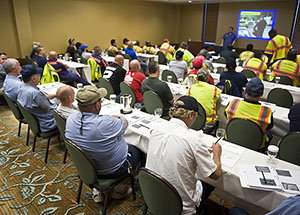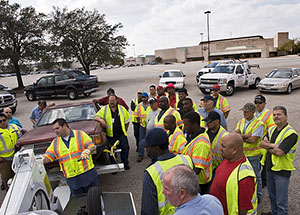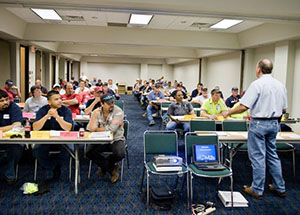
IITR History
The objective of the International Institute of Towing and Recovery (IITR) is to provide comprehensive training and resource materials to the towing and recovery industry. A tow truck operator can use the standardized course material to gain familiarity and experience needed to operate towing and recovery equipment in a safe, efficient and professional manner, and to communicate more effectively with customers and public agency personnel.
The University of Georgia (U of G) and the IITR developed the program “Towing and Recovery with Light Duty Light Duty Equipment. When the U of G discontinued the self-study program the IITR proceeded with the California State Automobile Association (CSAA) to develop the program into a hands-on multi-media instructor led program. The IITR holds copyrights for the program materials and would be licensing the program curriculum for use by instructors and organizations across the country.
The IITR, changed the direction of the program from a self-study correspondence course to a multi-media instructor led program that could be offered through auto clubs, insurance groups and towing associations. The IITR rather than actually teaching the classes would work with various entities to develop instructors and training programs for them using the IITR developed training materials.
In 2004, the Education Foundation of the Towing and Recovery Association of America (TRAA) and the IITR revised their respective bylaws and the IITR began the process of working with the TRAA to move to the administrative responsibilities from the University of Georgia (UGA) to the IITR and under the umbrella organization of the TRAA Education Foundation. With the support of the TRAA Education Foundation, one of IITR’s goals is to contribute to the further standardization of educational and training practices developing a core curriculum of training guidelines for the towing and recovery industry.
According to the agreement between the IITR and the TRAA Education Foundation, the IITR was to function as a completely autonomous and independent entity from other divisions of the Education Foundation but now be under the Foundations non-profit tax exempt 503(c3) status. The IITR would operate under its own by-laws and be responsible for its own financial viability including generating revenue, payment of all debts, legal obligations and submit a financial statement to the TRAA each year for a consolidated tax filing.
One of IITR's initial goals was to contribute to the further standardization of educational and training practices for the towing and recovery industry. IITR has now moved beyond its original self-study program and developed a completely revised multi-media Instructor- led training Program. In addition, and a Self-Study and Supervisor's Guide has been created to facilitate small-group instruction. The IITR Core-Curriculum training program or outline was adapted by the TRAA as an example for trainer and for other towing training programs.
At this point, the IITR had accomplished the following goals:
- Developed a web site, IITROnline
- Completed an updated instructor-led PowerPoint presentation for the training of light-duty towing and recovery operators
- Completed an Instructor Led Program.
- The Self-Study Guide has also been completely revised and updated.
- Worked with various entities to develop club or state specific modules for vehicle laws and regulations
- Completed an IITR Self Study Guide.
- Completed a Supervisor's Guide for use with the Self Study Guide.
- Developed an industry specific Train-the Trainer program
- Developed a hands-on component for the instructor-Led training program.
Upon completion of the two or three-day course, the TRAA National Certification Exam could be administered for national certification. Passing the TRAA national certification indicates the tower has attained a level of skill that is a standard nationwide with regard to tower safety and professionalism.
These were huge accomplishments, and we were pleased with our progress. IITR and its other industry contributors continue the tasks of content development and materials revisions as well as development of related manuals and CDs for the instructor-led classes. Course materials are periodically reviewed and updated to stay current with improvements or changes in equipment and technology, and to ensure that both courses reflect industry standards and practices, towing-industry manufacturer's recommendations and are consistent with local, state and federal regulations.
One issue that had to be addressed initially was the fact that the University of Georgia Light Duty Manual (now the IITR) and the TRAA National Driver Certification Program Study Guides were regularly being copied and plagiarized. The IITR has had to address this issue periodically over the years. In 2014, the IITR was in mediation with a third party with regard to their use of IITR training materials. The TRAA Education Foundation, although not a party to the action, notified the IITR that it was their wish that the IITR drop any legal action to defend their intellectual property and copyrighted materials. However, at the time, the IITR had no option but to try and move forward and resolve the issue. The TRAA Education Foundation immediately terminated the agreement with the IITR.
IITR has been able to develop and maintain an industry standard for quality education in the towing industry by capitalizing on the strengths of its many industry partners, from towing and recovery professionals across the country, to AAA and its affiliated clubs, towing equipment manufacturers and other educational entities. This collaborative working model ensures an unbiased approach to industry education that others cannot match. The IITR publishes monthly articles based on its training program on a variety of subject as well as working with various state and federal agencies on regulation and safety issues. In its commitment to the industry, IITR recently petitioned the Federal Motor Carrier Safety Administration for a clarification of the Federal Regulation relating to the securement of automobiles, light trucks and vans on car carriers and was granted an exemption that specified four points of securement rather than just two that are called for in the current regulations.



